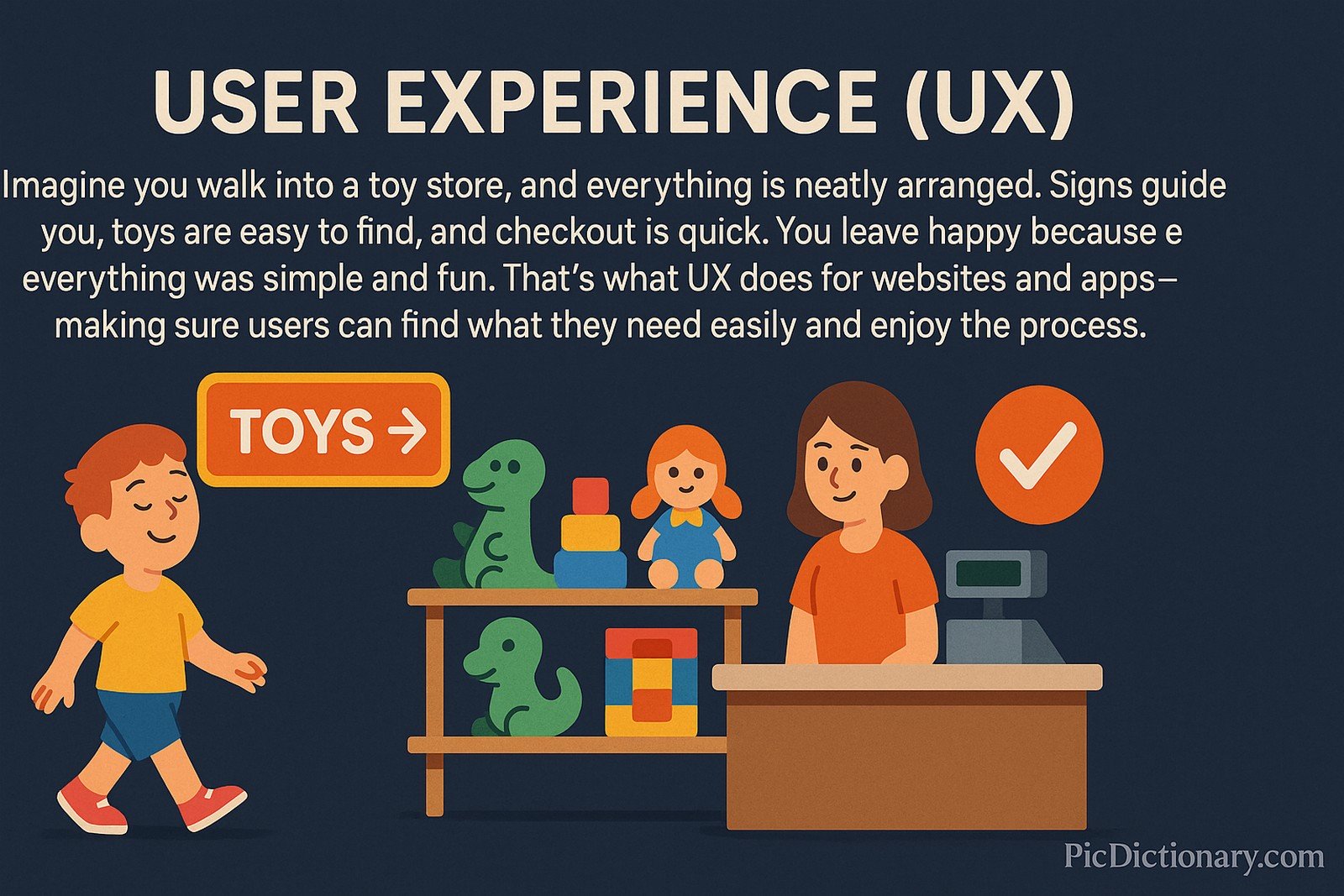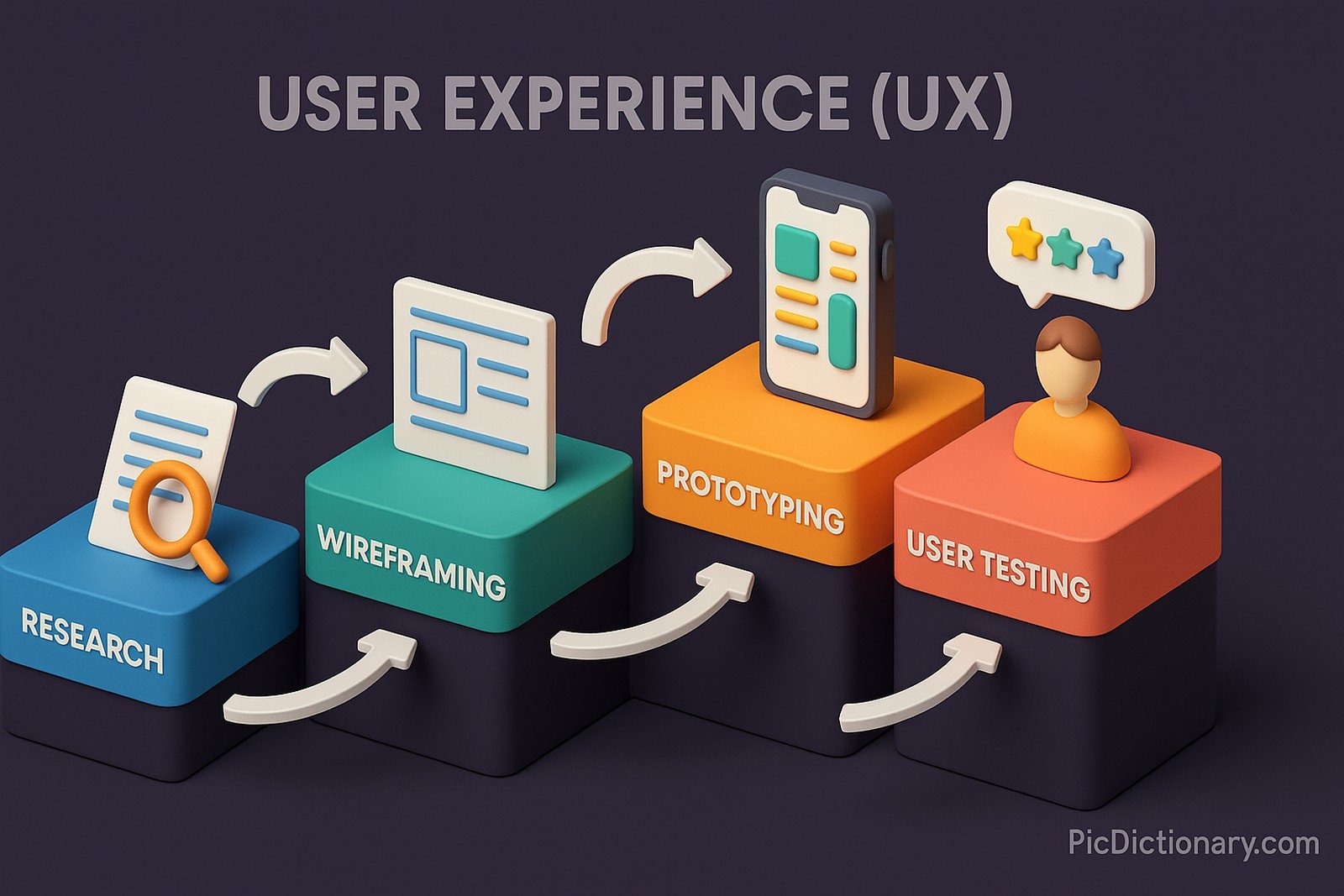User Experience (UX)

(Representational Image | Source: Dall-E)
Quick Navigation:
- User Experience (UX) Definition
- User Experience (UX) Explained Easy
- User Experience (UX) Origin
- User Experience (UX) Etymology
- User Experience (UX) Usage Trends
- User Experience (UX) Usage
- User Experience (UX) Examples in Context
- User Experience (UX) FAQ
- User Experience (UX) Related Words
User Experience (UX) Definition
User Experience (UX) refers to the overall experience a person has when interacting with a product, system, or service. It encompasses usability, accessibility, efficiency, and satisfaction. UX design focuses on optimizing these aspects to create intuitive, seamless, and enjoyable interactions. Key elements of UX include research, wireframing, prototyping, and user testing. Industries like software development, e-commerce, and mobile app design heavily invest in UX to enhance customer engagement and retention.
User Experience (UX) Explained Easy
Imagine you walk into a toy store, and everything is neatly arranged. Signs guide you, toys are easy to find, and checkout is quick. You leave happy because everything was simple and fun. That’s what UX does for websites and apps—making sure users can find what they need easily and enjoy the process.
User Experience (UX) Origin
The concept of UX emerged in the 1990s, popularized by cognitive psychologist Don Norman while working at Apple. He emphasized that technology should be user-friendly and intuitive. However, UX principles existed long before in industrial design, human factors engineering, and ergonomics.
User Experience (UX) Etymology
The term "user experience" combines "user" (the person interacting with the product) and "experience" (the interaction's overall impression). It highlights the goal of ensuring products provide a positive, seamless interaction for users.
User Experience (UX) Usage Trends
UX has evolved rapidly due to the digital transformation of businesses. Companies prioritize UX in product design to boost conversion rates, reduce customer churn, and improve brand loyalty. Trends like AI-driven personalization, voice interface design, and inclusive accessibility are shaping modern UX strategies.
User Experience (UX) Usage
- Formal/Technical Tagging:
- Human-Computer Interaction
- Digital Product Design
- Usability Engineering - Typical Collocations:
- "UX research"
- "UX design principles"
- "User-centered approach"
- "Seamless user experience"
User Experience (UX) Examples in Context
- A well-designed e-commerce website allows users to find products quickly and check out without frustration.
- Mobile apps that offer personalized content recommendations based on user behavior enhance engagement.
- Airline booking systems with intuitive navigation and clear pricing improve customer satisfaction.
User Experience (UX) FAQ
- What is UX in simple terms?
UX is how a person feels when using a product, like a website or app. - Why is UX important?
Good UX makes products easy and enjoyable to use, keeping users satisfied and engaged. - How is UX different from UI?
UX focuses on overall experience, while UI (User Interface) deals with design elements like buttons and colors. - What skills are needed for a UX designer?
UX designers need research, wireframing, usability testing, and prototyping skills. - What are the key principles of UX design?
Usability, accessibility, consistency, and user feedback-driven improvement. - How do businesses benefit from UX design?
Improved customer retention, higher sales, and reduced customer support costs. - Can UX design apply outside of digital products?
Yes, UX applies to physical products, services, and even spaces like airports and museums. - What is usability testing in UX?
It’s the process of evaluating a product by testing it with real users. - How does AI impact UX design?
AI enhances personalization and predictive design, improving user engagement. - Is UX a growing field?
Yes, with increasing digital reliance, UX demand continues to rise across industries.

User Experience (UX) Related Words
- Categories/Topics:
- Human-Computer Interaction
- Interaction Design
- Digital Product Development
Did you know?
Bad UX can cost companies millions. In 2018, a poorly designed checkout process on an e-commerce website caused a company to lose $300 million in revenue due to users abandoning their carts.
PicDictionary.com is an online dictionary in pictures. If you have questions or suggestions, please reach out to us on WhatsApp or Twitter.Authors | Arjun Vishnu | @ArjunAndVishnu

I am Vishnu. I like AI, Linux, Single Board Computers, and Cloud Computing. I create the web & video content, and I also write for popular websites.
My younger brother, Arjun handles image & video editing. Together, we run a YouTube Channel that's focused on reviewing gadgets and explaining technology.



Comments powered by CComment